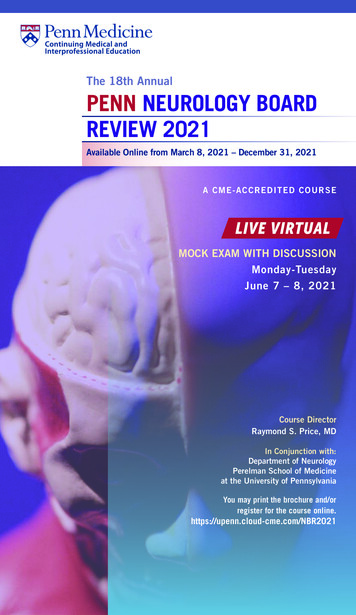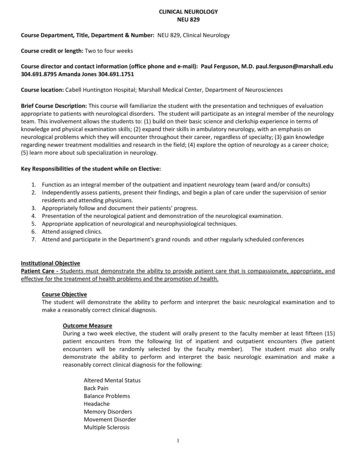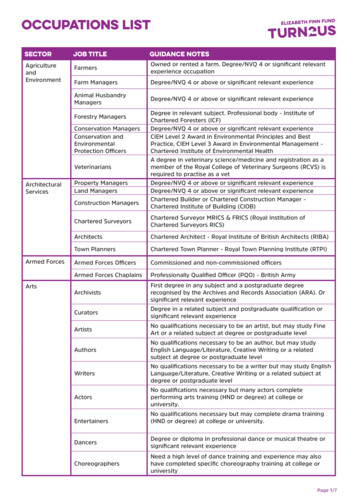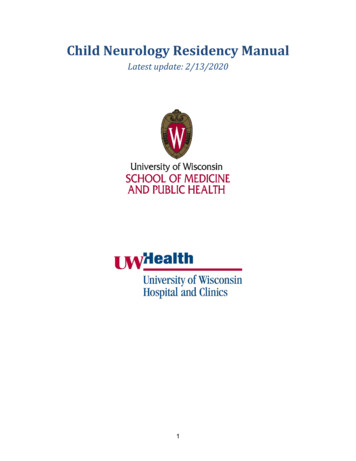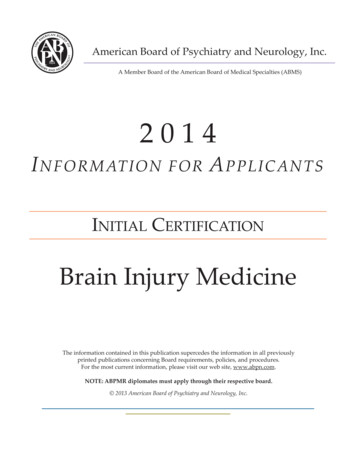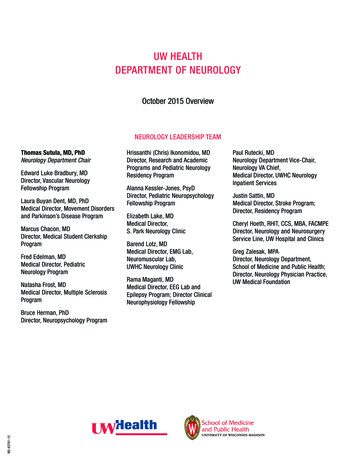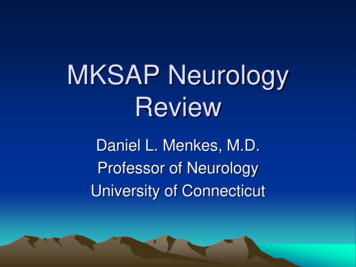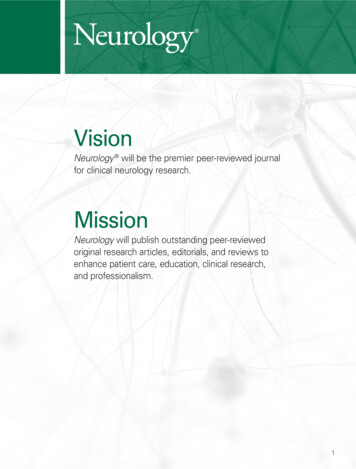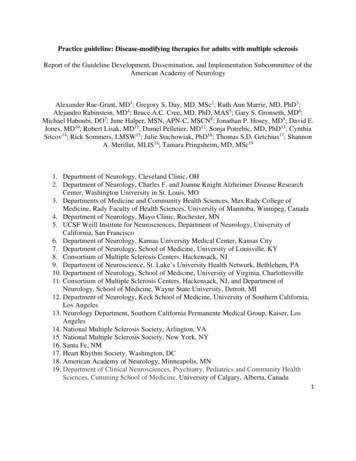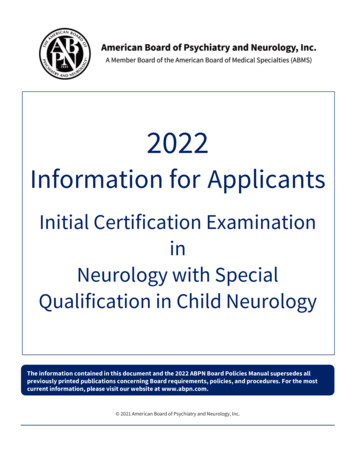
Transcription
2022Information for ApplicantsInitial Certification ExaminationinNeurology with SpecialQualification in Child NeurologyThe information contained in this document and the 2022 ABPN Board Policies Manual supersedes allpreviously printed publications concerning Board requirements, policies, and procedures. For the mostcurrent information, please visit our website at www.abpn.com. 2021 American Board of Psychiatry and Neurology, Inc.
Initial Certification Exam in Neurology withSpecial Qualification in Child NeurologyDates ChoicesSeptember 19-23, 2022Application DeadlineFebruary 10, 2022Late DeadlineMarch 3, 20222022 Fee Schedule*Examination feeIf your application is denied for any reason, the board will retain 500 of the examination fee for processing/evaluation of theapplication.Miscellaneous FeesLate fee (in addition to the above)Application/licensure appeal fee**Examination administration appeal fee**Irregular behavior appeal fee****Application for testing accommodations appeal fee**Duplicate certificate feeReturned check charge*All fees must be submitted in U.S. currency**Appeal fees are refundable if the decision is in the appellant’s favor 1945 500 350 350 350 350 150 50Please note:The ABPN reserves the right to revise fee schedule at any time. Throughout this publication, the American Board ofPsychiatry and Neurology, Inc. may be referred to as “the Board” or as “ABPN”.ATTENTION VETERANS: Some or all of your exam fees may be reimbursed through the Department of VeteransAffairs. Please contact the DVA for further information.
Important Dates for Initial Certification Exam in Neurologywith Special Qualification in Child NeurologyExam Date ChoicesSeptember 19-23, 2022Applications AvailableNovember 8, 2021Applicant completing training after July 31, 2022 shouldcontact the Board regarding eligibilityApplication DeadlineJanuary 15, 2022Deadline for Requesting an Application for ADAAccommodationsDeadline for Requesting an Application for Nursing MotherAccommodationsLate Application DeadlineFebruary 10, 2022Applicant should contact the Board if they have not receivednotification regarding their applicationScheduling Instructions EmailedJune 30, 2022Pearson VUE Registration OpensJuly 14, 2022Graduation verification due to the Board for residentsgraduating June 30, 2022Graduation verification due to the Board for residentsgraduating July 31, 2022Active, full, unrestricted license due to the Board orapplication is deniedJuly 15, 2022February 10, 2022February 10, 2022March 3, 2022July 7, 2022August 15, 2022September 1, 2022
Table of ContentsI.Training Information for Initial Certification Exam in Neurology with Special Qualification inChild NeurologyA. General Training Requirements1B. Training in More Than One Residency Training Program1C. Specific Training Requirements2D. Canadian Training Programs3II.Requirements for Admission to the Initial Certification Exam in Neurology with SpecialQualification in Child NeurologyA. General Requirements for all Applicants4B. Initial Certification in Neurology with Special Qualification in Child Neurology4III.Neurology with Special Qualification in Child Neurology Certification Exam: ApplicationProcess, Procedures, Format and ContentA. Application Process Information6B. Off-Cycle Graduating Residents6C. Other7D. Applicants with Disabilities7E. Applicants who are Nursing8F. Computer-Administered Exam Procedures8G. Neurology with Special Qualification in Child Neurology Certification Exam Format andContent9H. Grade Letters and Certificates9I. Computer-Administered Exam Appeals Procedures101. Appeal Procedure for Rejection of Credentials, Invalidation of ExaminationScore Due to Irregular Behavior, or Denial of a Request for DisabilityAccommodations102. Appeal Procedure for Computer-Administered Examination Compromise inAdministration10
I. Training Information for the Initial Certification Exam inNeurology with Special Qualification in Child NeurologyA. General Training RequirementsReferences to residency refer to entry at the second year of postgraduate (PGY-2) training, unless otherwise stated.Residency training must be in the specialty in which the applicant seeks certification, except for residents who are inan approved combined training program.Training programs approved by the residency review committees and accredited by the ACGME can be found on theACGME website at www.acgme.org.The required years of training may be completed on a part-time basis, provided that it is no less than half-time.The ABPN requires that all programs allow a minimum of four weeks of leave time (including vacation, sick time,maternity/paternity leave, etc.) during training per year. These four weeks should be averaged over the four-yeartraining period. Leave or vacation time may NOT be used to reduce the total amount of required residency training orto make up deficiencies in training. Programs must allow a minimum of 6 weeks of time away from training forpurposes of parental, caregiver, and medical leave at least once during training, without exhausting all other allowedtime away from training and without extending training. Within ABPN and ACGME policy guidelines, it is up to theprogram director and the program clinical competency committee to determine whether a given resident has mettraining requirements or must extend their period of training.All training must be completed by September 30, 2022.Effective for residents entering residency training (PGY-2 in child neurology) as of July 1, 2002:The 36 months of full-time, specialized residency training must be completed in no more than two blocks. Ifcompleted in two blocks, the blocks must not be more than 10 years apart.Effective for residents entering residency training (PGY-2 in child neurology) as of July 1, 2011:Full time residency training must be completed in no more than two blocks. If completed in two blocks, the blocksmust not be more than five years apart and the shorter block must not be less than six months long. One-year fulltime equivalent of subspecialty residency training must be completed in a continuous block of not less than one- halftime.B. Training in More Than One Residency Training ProgramTo ensure continuity of training, the Board requires that two of the three years of residency training, excluding thePGY-1, be spent in a single program. The ABPN credentials committee will consider an exception to this rule onlyunder extraordinary circumstances. In such cases, respective program directors should contact the Board office, inwriting, prior to the transfer. The letters must outline the resident’s training content, duties, and responsibilities,including exact dates (month/day/year to month/day/year) of training, and indicate clearly that the resident willsatisfy all ACGME program requirements as outlined on the ACGME website, www.ACGME.org. Each case will beconsidered on an individual basis.If the credentials committee approves the request, the Board will notify the program directors in writing. A copy ofthis letter should be given to the resident as well as noted in the resident’s ABPN preCERT record. Residents whohave not received prior approval from the Credentials Committee risk the possibility that the Board will deny theirapplication.When training is completed in more than one program, the training director of the first program should send the1
training director of the second program a letter detailing the training satisfactorily completed, including exact dates(month/day/year to month/day/year) of training, and areas of training that are deficient. After reviewing thisdocumentation, the training director of the second program should inform the resident whether or not the secondprogram will be able to provide the resident with the experience necessary to remove the deficits.C. Specific Training RequirementsProper preparation for the practice of child neurology requires that the practitioner be a qualified neurologist whohas had additional training in pediatrics and child neurology. To qualify for this certificate, a different type ofpreparation and certifying examination are required. The same diploma will be used, the only difference being thatinstead of certifying qualification in “neurology,” it certifies qualification in “neurology with special qualification inchild neurology.” Unless otherwise specified, all training must be completed in programs accredited by the ACGME(See sections on Canadian and Combined Training below). Different requirements apply for applicants who begantraining in child neurology prior to 1991. These candidates should contact the Board office if they have any questions.All applicants for the Child Neurology Certification Examination must successfully complete five clinical skillsevaluations that comply with the standards set forth in the document Requirements for Clinical Skills Evaluation ofResidents in Neurology and Child Neurology.THREE patterns of training are acceptable for two of the five years of training:1. General PediatricsThe usual pathway is two years of training in general pediatrics in an ACGME-accredited program. This isthe only pathway that allows the applicant admission for examination by both the American Board ofPediatrics (ABP) and the ABPN. Admission to ABP examination requires specific pediatric rotations.Residents who wish to be certified by the ABP should refer to the ABP website, www.abp.org, for thespecific rotation requirements.OR2. General Pediatrics/Basic Neuroscience ResearchOne year of training in general pediatrics in an ACGME-accredited program and one year of research in thebasic neurosciences. The basic neuroscience pathway was created as an alternative track for residents whoare planning a research career in academic child neurology. The year of basic neuroscience must providetraining in a research discipline related to child neurology and is intended to increase the trainee’sknowledge base and competitiveness for federal and nonfederal grant support. The trainee must make atleast an 80 percent time commitment to basic neuroscience during this year of training.For the purpose of this training track, “basic neuroscience” is defined as laboratory research related to thecellular or molecular basis of neurologic diseases. Examples of relevant basic disciplines include molecularneurogenetics, neurochemistry, neuropharmacology, neurophysiology, neuroanatomy, neuroimmunology,developmental neurobiology, biophysics, and cell biology.Effective for residents entering residency training in child neurology as of July 1, 2003, the written proposalfor the neurosciences research training track must be submitted to the Board for approval no later than sixmonths prior to the date the research training track is to begin. A form to guide the applicant’s descriptionof the research, his or her role, skills to be acquired, and the likely outcomes (e.g., presentations and/orpeer-reviewed manuscripts) is part of the information to be provided. Credit will be given for basicneuroscience training obtained as part of an integrated clinical neuroscience program leading tocertification in neurology with special qualification in child neurology. Credit cannot be obtained for basicneuroscience training obtained as part of a degree-granting program (e.g., PhD).Residents entering child neurology training prior to July 1, 2003, must have this training track approved bythe Board prior to completion of the five years of training.A program director who intends to propose a neuroscience research training track for a resident shouldcontact the Credentials Department at the Board office to request the proposal form. The form may also be2
downloaded from the ABPN website, www.abpn.com. This form, along with letters from the mentor (andchild neurology program director, if a different individual), must be submitted and must describe theresearch and explain how the year of neuroscience relates to child neurology and to the trainee’s academiccareer. All documentation of pediatrics training must also be submitted. Documentation must includeexact dates of training (from month/day/year to month/day/year).OR3. General Pediatrics/Internal Medicinea. One year of training in general pediatrics and one year of training in internal medicine in ACGMEaccredited programs.b. An acceptable alternative to the one year of internal medicine is a full year of ACGME-accredited trainingthat includes a minimum of six months of training in internal medicine, the details of which must bedocumented by the training director. The composition of these six months may NOT include rotations inneurology, family medicine, pediatrics, or emergency medicine. To ensure that these six months constitutea high-quality experience, they should emphasize progressive responsibility for the resident.i. At least two of the additional six months of training must be spent in any combination of internalmedicine, pediatrics, and/or emergency medicine.ii. For candidates entering child neurology residency training on or after July 1, 2002, at least two ofthe additional six months must be spent in any combination of internal medicine, pediatrics, familymedicine, and/or emergency medicine.iii. No more than two of the remaining four months may be spent in neurology.ANDAll candidates will be required to complete three full years of postgraduate, specialized residency training in a childneurology program accredited by the ACGME.D. Canadian Training ProgramsCanadian residents may apply for the ABPN examination if they meet the following requirements:1. Completed their training in a Canadian program accredited by the Royal College of Physicians and Surgeons ofCanada AND2. Achieve certification by the Royal College of Physicians and Surgeons of Canada AND3. Possess an unrestricted license to practice medicine in a Canadian provinceAll requirements must be met, and documentation must be received by September 1, 2022. Please contact theBoard for additional information at credentials@abpn.com.Other International Training: Currently, the ABPN does not accept other international training.3
II. Requirements for Admission tothe Initial Certification Exam inNeurology with Special Qualification in Child NeurologyA. General Requirements for All ApplicantsTo qualify to sit for examination, an applicant must:1. Be a graduate of an accredited medical school in the United States or Canada or of an international medical schoollisted by the World Health Organization.2. Have an active, full, unrestricted medical license as defined in the separate Board Policies Manual on the ABPNwebsite. Applicants are required to update their active, full, unrestricted medical licenses in their ABPN PhysicianPortal account.3. Have completed five clinical skills evaluations.4. Have satisfactorily completed the Board’s specific training requirements in neurology, as described in Section I.5. Submit a completed official online application including all required attachments and the appropriate examinationfees by the specified deadlines. Applicants are required to apply online through their ABPN Physician Portal accountat www.abpn.com/physicianportal.All training must be confirmed either by way of the ABPN preCERT system or by submitting documentationnoting the completion of training requirements.If you are unable to activate your account, you may need to submit a request to apply for the examination. Thisprocess may take up to three business days. Therefore, we encourage applicants to allow enough time to submit therequest prior to the deadline for applications.The deadline for submission of a completed application is February 10, 2022.*Applicants for specialty certification examinations who do not yet have an unrestricted medical license because theyare in training are not required to submit their medical license at the time of application for the examination.However, such applicants must update their active, full, unrestricted medical licenses in their ABPN Physician Portalaccount no later than September 1 of the year of the examination. If the active, full, unrestricted medical license hasnot been updated in the appropriate Physician Portal account by September 1, the application will be denied, and theBoard will retain 500 of the examination fee for processing/evaluation of the application.B. Initial Certification in Neurology with Special Qualification in Child NeurologyEffective January 1, 2012, ABPN will require physicians to become Board certified within seven years followingsuccessful completion of ACGME-accredited or ABPN approved residency training in their primary specialty.Graduates may take the ABPN certification examination as many times as allowed during the 7-year period.Certification examinations are offered once a year.For instance, individuals who have completed an accredited residency program prior to January 1, 2012 will haveuntil January 1, 2019 to become board certified.Individuals who do not become certified during the 7-year period (or before January 1, 2019 for those who completedresidency training before January 1, 2012) will be required to (1) repeat the required clinical skills evaluations; and (2)complete one stage of MOC [(90 CME credits, 24 self-assessment CME credits, and 1 PIP Activity (includes a clinicalmodule or feedback module)] in order to be credentialed to take the ABPN Certification Examination.4
Changes in the Credentialing ProcessThe ABPN has made changes in the credentialing process effective for residents who entered residency training inpsychiatry on or after July 1, 2007 (PGY-1) or July 1, 2008 (PGY-2). Some of the clinical skills evaluations that wereconducted previously in the Part II oral examination are now taking place within the residency program and theresidents will be required to submit documentation of satisfactory performance in the evaluation of clinical skills aspart of the ABPN credentialing process. Assessment of other clinical skills has been integrated into the computerizedCertification examination beginning in 2011.Candidates who successfully pass the neurology/child neurology certification examination will be awarded acertificate in their specialty. NOTE: there is no Part II oral examination for candidates who entered residency trainingin neurology/child neurology on or after July 1, 2007 (PGY-1) or July 1, 2008 (PGY-2).Admission to the neurology/child neurology certification examination requires completion of five clinical skillsevaluations that comply with the standards set forth in the document Requirements for Clinical Skills Evaluation inNeurology and Child Neurology.In addition to documentation of their PGY-1 and residency training, all physicians must submit documentation fromthe program director of an ACGME accredited neurology/child neurology program verifying completion of the fiveclinical skills evaluations or verifying that the five clinical skills evaluations will be completed by July 31, 2022.Physicians who do not provide acceptable documentation of successful completion of the five clinical skillsevaluations by the deadline will be denied an opportunity to sit for the certification examination. For physicians in thepreCERT system, verification of training is done in preCERT .Residents who entered residency training in neurology/child neurology prior to July 1, 2007 (PGY-1) or July 1, 2008(PGY-2):Physicians who entered neurology/child neurology training prior to July 1, 2007 (PGY-1) or July 1, 2008 will not havecompleted the clinical skills evaluations that are currently required during residency training. Such physicians will berequired to complete the required five clinical skills evaluations in an ACGME-accredited program and comply withthe standards set forth in the document Requirements for Clinical Skills Evaluation in Neurology and Child Neurologybefore they will be admitted to the certification examination. Evaluations must be completed by July 31, 2022. Referto document on the ABPN website.5
III. Neurology with Special Qualification inChild Neurology Certification Exam:Application Process, Procedures, Format and ContentA. Application Process InformationInformation in this section is important for all candidates. Please read carefully.Applicants are required to apply online through their ABPN Physician Portal atwww.abpn.com/physicianportal. If you are unable to activate your account, you may need to submit a request toapply for the examination. This process may take up to three business days. Therefore, we encourage applicants toallow enough time to submit the request prior to the deadline for applications.The Information for Applicants publication and the associated Application for Initial Certification are revised eachyear. The Information for Applicants document may be downloaded from the ABPN website.The applicant will receive an email confirming that the application was received.Applications are reviewed in the order of receipt. Applicants who do not receive any notification from the Boardregarding their applications by June 30, 2022 should contact the Board office to inquire about the status of theirapplication. Applicants are required to keep their email, mailing address, and license information up to date in ABPNPhysician Portal.NOTE: Applicants denied admission to the examination are notified of their deficiencies in meeting therequirements of the Board. If your application is denied for any reason, the Board will retain 500 of theexamination fee for processing/evaluation of the applicant.B. Off-Cycle Graduating ResidentsPrior to July 31, the ABPN must receive written notification from the program director that the resident will not finishtraining by July 31 but will finish no later than September 30, 2022. The program director must confirm to ABPN viathe preCERT system that training has been successfully completed immediately after he/she has finished training.Once confirmation is received the resident has completed training, we will notify the applicant that they may proceedwith scheduling a date for their exam.Once approved, ABPN will email the applicant scheduling instructions that allows them to schedule the certificationexam. Applicants must sit for certification within three weeks of being approved. This may require sitting for theexamination in mid to late October. Applicants are responsible for updating their email address through their ABPNPhysician Portal account to ensure they receive the instructions in a timely manner. The Board will be unable toextend examination dates due to an incorrect email address on file.Please note that ABPN does not guarantee the availability of locations, dates and/or times of Pearson VUE testcenters. If an applicant cannot schedule an appointment that initially suits their needs, the applicant should makethe best appointment he/she can at that time. The applicant may then contact Pearson VUE periodically toreschedule if a more suitable appointment becomes available.ABPN will not allow a candidate to sit for the certification examination if training has not been completed bySeptember 30 in the year of the certification examination.6
C. OtherApplicants who complete training after September 30, 2022, will be denied an opportunity to sit for the 2022Neurology with Special Qualification in Child Neurology Certification Examination.Training LicensesApplicants who submit a training license with their application, must update their active, full, unrestricted license intheir ABPN Physician Portal account by September 1, 2022. Applicants who do not update their full, unrestrictedmedical license by September 1, 2022, will be denied to sit for the 2022 Child Neurology Certification Examination.Training Program DocumentationApplicants who do have training records in the ABPN preCERT system: Please check with your program if you are unclear if your information is in preCERT Please note that before you can apply, your rotations from PGY-1 through PGY-3 must be entered by your program,attested to and marked complete. In addition, your PGY-4 rotations must be entered but not attested to.Applicants who do not have training records in the ABPN preCERT system: All documentation must include exact dates of training (from month/day/year to month/date/year) and besubmitted by letter from the program director.Note: For residents who completed both the PGY-1 and residency training in the same program, a letter documentingboth may be included together in one letter. For residents completing training on June 30, 2022:If documentation of successful completion of training by attestation in the ABPN preCERT system is not received bythe July 15, 2022 deadline, the candidate may be removed from the examination roster and may be denied to sit forthe 2022 Neurology with Special Qualification in Child Neurology Certification Examination. For residents completing training after June 30 but by September 30, 2022.If documentation of successful completion of training by attestation in the ABPN preCERT system is not received bythe September 30, 2022 deadline, the candidate may be removed from the examination roster and may be denied tosit for the 2022 Neurology with Special Qualification in Child Neurology Certification Examination.D. Applicants with DisabilitiesThe Board recognizes that physicians with disabilities may wish to take the examinations and will attempt to makeaccommodations for applicants with verified disabilities. The Board supports the intent of the Americans withDisabilities Act (ADA) and amendments thereto. The Board will provide reasonable accommodations during testing toprovide equal opportunity for persons with disabilities. Applicants are reminded that modifications,accommodations, auxiliary aids and/or services can only be offered if they do not “fundamentally alter themeasurement of the skills or knowledge the examination is intended to test” (28 C.F.R. §36.309(b)(3)).Any applicant who requests accommodations during the application process because of a disability must advise theBoard electronically or in writing no later than the deadline for submitting applications for examination.All items must be submitted to the Board by emailing the complete application to questions@abpn.com no later than30 days after the application deadline regardless of previous requests and/or granted accommodations. An Application for Testing Accommodations pdf form, All appropriate checklists, Personal statement All documentation, and All other evidence substantiating the disability. If available, NBME/NBOME accommodation approval letter.7
E. Applicants who are NursingAny applicant who will be nursing at the time of their examination may request a private space for lactation byadvising the Board in writing by emailing this form to questions@abpn.com. There may be a delay in scheduling anappointment at a Pearson VUE test center if your request is received later than 90 days prior to the first publishedadministration date of the examination.F. Computer-Administered Examination ProceduresApproximately two months prior to the examination, scheduling information is emailed to candidates whoseapplications have been approved using the email address provided through the candidate’s portal. Candidates areurged to contact Pearson VUE as soon as scheduling opens using their Pearson account to make an appointmentfor the examination. A delay in contacting Pearson VUE can result in fewer available openings for the examinationin a candidate’s choice of date and location. ABPN does not guarantee the availability of locations, dates and/ortimes of Pearson VUE test centers.If the first and last name that the candidate applied under is different than the name that appears on theidentification, certified, legal documentation (marriage license, name change determination, etc.) verifying the namechange must be submitted to the Board office prior to the date of the examination.Address and/or email address changes must be updated online through the ABPN Physician Portal atwww.abpn.com/physicanportal. These changes will be automatically uploaded to Pearson.Candidates are required to present two forms of identification upon arrival at the testing center. One of the formsof identification must be government issued and must display a recent, permanently affixed photograph. Bothforms of identification must be signed, and both must be valid (not expired). The first and last names on bothidentifications must match the name on file with the ABPN. Pearson will not verify middle names, suffixes or initialsfor admission to an examination. Failure to comply with these requirements may result in the candidate’s inabilityto gain admission to the examination. If a name change has recently occurred, it is recommended to bring a copy oflegal documentation to the testing center on the appointment date. Government- issued identification includesmilitary identification, passports, driver’s licenses, and state identification cards. Secondary Identification includesa Social Security card, valid credit card, bank automated teller machine card.Candidates may NOT bring food, drink, cellular phones, pagers, other electronic devices, books, study materials, orother personal belongings, including watches and wallets, into the examination room. A secure locker is available tostore personal items. Candidates may not access phones or other devices of any kind while on an unscheduledbreak. Accessing prohibited items during an unscheduled break constitutes irregular behavior and may be cause forinvalidation of examination result (See separate Board Policies Manual).Candidates are NOT permitted to leave the testing center’s building during a test section. Leaving the buildingduring a test section constitutes irregular behavior and may be cause for invalidation of examination results (Seeseparate Board Policies Manual).Candidates are photographed and are required to provide an electronic
in neurology/child neurology on or after July 1, 2007 (PGY-1) or July 1, 2008 (PGY-2). Admission to the neurology/child neurology certification examination requires completion of five clinical skills evaluations that comply with the standards set forth in the document Requirements for Clinical Skills Evaluation in Neurology and Child Neurology.
